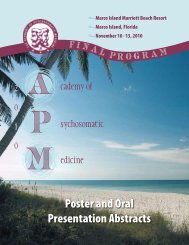Table of Contents - Academy of Psychosomatic Medicine
Table of Contents - Academy of Psychosomatic Medicine
Table of Contents - Academy of Psychosomatic Medicine
Create successful ePaper yourself
Turn your PDF publications into a flip-book with our unique Google optimized e-Paper software.
Poster Presentations<br />
Thursday, November 12, 2009<br />
4:00 PM – 6:00 PM<br />
1. Symptom Indicator <strong>of</strong> Severity <strong>of</strong><br />
Depression in Cancer Patients: A Comparison<br />
<strong>of</strong> the DSM-IV Criteria with Alternative<br />
Diagnostic Criteria<br />
Presenting Author: Tatsuo Akechi, MD, PhD<br />
Co-Authors: Tetsuji Ietsugu, PhD, Masune Sukigara, PhD,<br />
Hitoshi Okamura, MD, PhD, Tomohito Nakano, MD, PhD,<br />
Nobuya Akizuki, MD, PhD, Masako Okamura, MD, PhD, Ken<br />
Shimizu, MD, PhD, Toru Okuyama, MD, PhD, Toshiaki Furukawa,<br />
MD, PhD, Yosuke Uchitomi, MD, PhD<br />
Purpose: Although the severity <strong>of</strong> major depression should<br />
be a relevant indicator for treatment implementation in cancer<br />
patients, especially the administration <strong>of</strong> antidepressants,<br />
determining the severity <strong>of</strong> major depression in cancer<br />
patients as well as diagnosing major depression has been<br />
challenging. The objective <strong>of</strong> this study was to explore the<br />
performances <strong>of</strong> several diagnostic criteria items for judging<br />
the severity <strong>of</strong> major depression among cancer patients.<br />
Methods: Using modern item response theory, we examined<br />
the performances <strong>of</strong> the diagnostic criteria outlined by the<br />
DSM-IV and two sets <strong>of</strong> conceptual diagnostic criteria (the<br />
Endicott and the Cavanaugh criteria) in a series <strong>of</strong> 728 cancer<br />
patients who had been referred to the Psychiatry Division<br />
and diagnosed with major depression using an inclusive<br />
approach.<br />
Results: While all the DSM-IV diagnostic criteria had a low<br />
ability for discriminating the severity <strong>of</strong> depression, two proposed<br />
items (not participating in medical care and social<br />
withdrawal) appeared to be good markers <strong>of</strong> moderately severe<br />
major depression among cancer patients. In addition,<br />
the items, “fearfulness or depressed appearance in face or<br />
body posture” and “brooding, self-pity, or pessimism” may<br />
be good markers for mild major depression, while the item,<br />
“cannot be cheered up, doesn’t smile, no response to good<br />
news or funny situations” may be a good marker for severe<br />
major depression.<br />
Conclusions: The present study suggests alternative criteria<br />
may have utility in diagnosing depression severity in cancer<br />
patients.<br />
References:<br />
Judd FK, et al. Handbook <strong>of</strong> studies on general hospital psychiatry.<br />
New York: Elsevier, 1991<br />
2. Randomized Placebo-Controlled Trial <strong>of</strong><br />
Ramelteon for Seasonal Affective Disorder<br />
Presenting Author: Edward Norris, MD, FAPM<br />
1<br />
Co-Authors: Karen Burke, RN, Carol Foltz, PhD, Michael<br />
Kaufmann, MD<br />
Purpose: One major theory regarding the etiology <strong>of</strong> seasonal<br />
affective disorder (SAD) suggests that the lack <strong>of</strong> natural<br />
light accompanying the winter season is the central cause<br />
<strong>of</strong> a misalignment <strong>of</strong> the circadian rhythm. This study assessed<br />
if ramelteon, a novel sleep-promoting agent with high<br />
selectivity for the MT1/MT2 receptors in the brain’s SCN,<br />
could resynchronize the circadian rhythm and decrease depressive<br />
symptoms associated with SAD.<br />
Methods: In this single-site, single-blind, parallel-group<br />
study, participants with a DSM-IV diagnosis <strong>of</strong> SAD were<br />
randomly assigned to receive either ramelteon 8 mg or placebo<br />
in addition to their usual care by a Psychiatrist and<br />
assessed monthly for four months. The mean change from<br />
baseline in the Zung depression scale and the Structured<br />
Interview Guide for the Hamilton Depression Rating Scale,<br />
SAD version (SIGH-SAD) were used to assess depressive<br />
symptoms. Takeda Pharmaceuticals North America, Inc<br />
sponsored the investigator who initiated this clinical trial.<br />
Results: Fifty participants were enrolled, 49 were randomized<br />
to receive ramelteon (n=25) or placebo (n=24). Allowing<br />
for drop-outs, the efficacy sample included 45 participants<br />
who had at least 1 follow-up (ramelteon, n=24; placebo,<br />
n=21). At baseline, there were no significant demographic<br />
differences between the 2 treatment groups, with a mean<br />
age <strong>of</strong> 46.6 years and predominantly female (74%). The ramelteon<br />
group had significantly lower Zung scores at month<br />
2 (ramelteon 52, placebo 59, p



